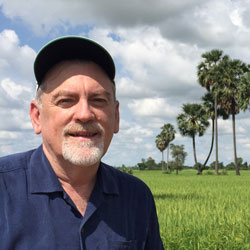
RESHAPING AGRICULTURE FOR BETTER NUTRITION –
The Agriculture, Food, Nutrition, Health Nexus
13-14 August 2018, Canberra

Professor Glenn Denning
 Glenn Denning is Professor of Professional Practice at Columbia University’s School of International and Public Affairs, where he directs the Master of Public Administration in Development Practice. He chairs the Earth Institute’s Practice Committee and is Senior Policy Advisor for the UN Sustainable Development Solutions Network. Denning have advised governments and other organizations on agriculture and food security in more than 50 countries. He served on the UN Millennium Project Hunger Task Force (2004-6), the Senior Steering Group of the UN High Level Task Force on the Global Food Security Crisis (2009-13), and the Technical Advisory Committee of the Global Agriculture and Food Security Program (2010-13). Denning – a UQ graduate – worked in the CGIAR system for 24 years and held senior management positions at IRRI and the World Agroforestry Centre.
Glenn Denning is Professor of Professional Practice at Columbia University’s School of International and Public Affairs, where he directs the Master of Public Administration in Development Practice. He chairs the Earth Institute’s Practice Committee and is Senior Policy Advisor for the UN Sustainable Development Solutions Network. Denning have advised governments and other organizations on agriculture and food security in more than 50 countries. He served on the UN Millennium Project Hunger Task Force (2004-6), the Senior Steering Group of the UN High Level Task Force on the Global Food Security Crisis (2009-13), and the Technical Advisory Committee of the Global Agriculture and Food Security Program (2010-13). Denning – a UQ graduate – worked in the CGIAR system for 24 years and held senior management positions at IRRI and the World Agroforestry Centre.
Delivering Results: Policies and Practices for Change
Abstract
On 25 September 2015, the 193 members of the UN General Assembly unanimously agreed to “End Hunger” by 2030 through their agreement on the 2030 Agenda on Sustainable Development. Under Sustainable Development Goal (SDG) 2, the world’s leaders agreed not only to “End Hunger”, but to “Achieve Food Security and Improved Nutrition, and Promote Sustainable Agriculture” – an extraordinarily ambitious agenda of 8 targets and 14 indicators encompassing hunger, agriculture, environment, nutrition, trade and investment. Approaching three years into the 2030 Agenda, an impressively large number of governments, international agencies, NGOs, business and universities have embraced SDG 2, along with several other complementary SDGs, as a framework for action towards achieving a healthier and more sustainable global food system. However, delivering results through policies and programs is proving more challenging. In presenting their Voluntary National Reviews to the United Nations, most countries have reported on their aspirational plans and good intent. Results at scale are few and far between. In this Overview, I will share personal experience from four countries (Cambodia, Malawi, Timor-Leste and Tajikistan) to identify strategic operational and design lessons that can inform a more effective response to SDG 2. My conclusion is that SDG 2 is by and large achievable. Across all targets, we have the knowledge and the financial resources to enable an unprecedented positive transformation of our global food system. All that’s required is genuine, sustained political commitment and creative implementation strategies.
